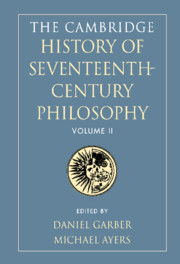30 - Ideas and objective being
from VI - The Understanding
Published online by Cambridge University Press: 28 March 2008
Summary
INTRODUCTION
It has often been taught, and may in dark corners still be taught, that in the seventeenth century epistemology was transformed by a new notion of ‘ideas’ as the immediate objects of perception and thought. Henceforward, it was said, philosophy was saddled with ‘representative’ theories of perception and knowledge that gave rise first to the metaphysical isolation of the mind and then to the thoroughgoing idealism of the following century. In the eighteenth century itself, the realist Thomas Reid saw the Cartesian theory of ideas as the error which, by insinuating a veil or tertium quid between the mind and reality, set philosophy on a course leading logically to the scepticism of Hume. Proponents of such an account in the recent past, however, have been less likely to be realists than conceptualists eager to announce that traditional epistemology, in turn, has made way, or ought to make way, for something else, whether for the philosophy of language, for ‘naturalism’, or for some more refined and elusive form of ‘edifying discourse’.
Recent (and some less recent) work on theories of ideas has undermined this influential story. The epistemological debates of the seventeenth century no doubt supplied the seed-bed of later idealism, but there was no sudden, radical departure, least of all by Descartes, from traditional frameworks for dealing with the relation between thought and its objects. As his own explanations emphasise, Descartes’s use of the old term ‘idea’ was only mildly innovative.
- Type
- Chapter
- Information
- The Cambridge History of Seventeenth-century Philosophy , pp. 1062 - 1107Publisher: Cambridge University PressPrint publication year: 2000
References
- 11
- Cited by



